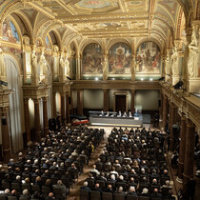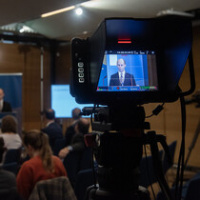ATTOSECOND SCIENCE - From Basic Research to Cancer Detection
Krausz Ferenc és Mihaela Žigman előadása az Akadémián
Az MTA Fizikai Tudományok Osztálya tisztelettel meghívja Önt nyílt ülésére, melyen Krausz Ferenc és Mihaela Žigman
ATTOSECOND SCIENCE - From Basic Research to Cancer Detection
című előadását hallgathatják meg a daganatos betegségek korai diagnosztikája érdekében indított új projektről.
Időpont: 2019. november 27. 10:00-11:00 óra között
Helyszín: MTA Székház, Felolvasóterem, 1051 Budapest, Széchenyi István tér 9., 1. emelet
Krausz Ferencet, az MTA külső tagját az Eötvös Loránd Fizikai Társulat (ELFT) tiszteletbeli tagjának választották. Előadása az ELFT tiszteletbeli tagi székfoglaló előadása is egyben.
Az előadások kivonata:
ATTOSECOND SCIENCE - From Basic Research to Cancer Detection Ferenc Krausz & Mihaela Žigman Max Planck Institute of Quantum Optics, Garching, Germany Ludwig-Maximilians-Universität München, Munich, Germany Center for Molecular Fingerprinting (CMF), Budapest, Hungary
Born around the turn of the new millennium, attosecond metrology has provided real-time insight into atomic-scale electron motions and light field oscillation, previously inaccessible to human observation. Until recently, this capability has relied on attosecond extreme ultraviolet pulses, generated and measured in complex vacuum systems. Next-generation attosecond metrology is now about to change this state of matters profoundly. Sub-femtosecond current injection into wide-gap materials can directly probe ultrafast electron phenomena in condensed matter systems and also be used for sampling the electric field of light up to ultraviolet frequencies. Petahertz field sampling draws on a robust solid-state circuitry and routine few-cycle laser technology, opening the door for complete characterization of electromagnetic fields all the way from the far infrared to the vacuum ultraviolet. These fields, with accurately measured temporal evolution, serve as a unique probe for the polarization response of matter. Field-resolved spectroscopy will access valence electronic as well as nuclear motions in all forms of matter and constitutes a generalization of pump-probe approaches. Its implementation, with a solid-state instrumentation, opens the door for real-world applications. One of them is the detection of diseases and health monitoring by measuring miniscule changes of the molecular composition of blood serum/plasma (liquid biopsy) via field-resolved infrared molecular fingerprinting. We shall present first results of pilot studies on four different cancer entities and plans for building a new research center dedicated to exploring the potential of molecular profiling for disease detection and health monitoring.
A projektről és az előadókról előzetesen itt tájékozódhat:
https://u-szeged.hu/sztehirek/2019-oktober/daganatos-betegsegek?objectParentFolderId=19396
https://u-szeged.hu/sztehirek/sajtoarchivum-2019-191002/sajtokozlemeny-daganatos?objectParentFolderId=1416
https://www.lasers4life.de/hu/#c9
http://www.esulab.org/ferenc-krausz/





